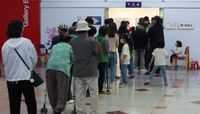On June 3, 2025, South Korea held its 21st presidential election amid a series of incidents and reports that highlighted both the enthusiasm and challenges of the democratic process. Across the country, voters turned out in large numbers to exercise their right, but several irregularities and complaints emerged, prompting investigations by election officials and police.
In Seoul’s Seocho-gu district, a notable controversy arose early in the morning at a polling station when a 56-year-old woman reported to police that election officials had pre-stamped the serial numbers and confirmation stamps on the ballots before voting began. According to the Election Management Committee (EMC) staff and observers, this measure was taken to prevent bottlenecks during voting, as confirmed by the officials on site. The polling station manager assured that ballots would be strictly managed according to established principles, emphasizing the importance of maintaining election integrity despite the procedural shortcuts.
While the pre-stamping was intended as a logistical convenience, it sparked concerns among some voters and observers about the potential for misuse or undermining the secrecy and security of the ballots. This incident was one among many that day that tested the robustness of election procedures.
Elsewhere in Seoul, at a polling station in Gangbuk-gu’s Suyu Elementary School, a 60-year-old woman who had already cast an advance vote returned during the main election day to check whether her name had been removed from the voter registry. She caused a disturbance before leaving the site prior to police arrival. Authorities indicated that they would investigate the incident further if formally reported by the EMC. This episode underscored the anxiety and vigilance some voters have regarding the accuracy and fairness of voter rolls.
Seoul’s election day was marked by a total of 54 election-related emergency calls (112 reports) by noon, reflecting a heightened sensitivity among citizens and officials alike to any perceived irregularities. These calls ranged from concerns about ballot handling to voter registration and other procedural matters.
In the city of Anyang, Gyeonggi Province, police investigated a suspicious case of possible duplicate voting. A voter identified as A reported that the signature on the ballot receipt section of the voter registry was not hers but instead bore the Chinese character '朴' (Park), a surname different from hers. Authorities confirmed that a person with the same name as A had already voted during early voting and did not attend the main polling station. Police suspect that an unidentified individual may have signed A’s ballot and voted in her stead. Voter A refused to participate in voting at the main polling station amid this confusion. Police and the EMC are working together to clarify the facts and ensure the legitimacy of the vote.
Another procedural hiccup occurred in Anyang’s Pyeongchon-dong polling station, where approximately ten ballots were distributed without the official polling station stamp. The EMC is currently reviewing whether these ballots will be considered invalid. Voters had raised complaints, and election officials promised to address the issue promptly.
In Inje-gun, a rural county in Gangwon Province, a similar problem surfaced at the 5th polling station in Inje-eup. Between 8 a.m. and 9 a.m., election officials mistakenly handed out unstamped ballots to voters. Ten voters completed their voting on these unstamped ballots before the error was noticed. According to Inje-gun EMC officials, these ballots will be transported to the central counting station after polls close at 8 p.m., where the National Election Commission will determine their validity. The local EMC expressed confidence that these ballots would not be invalidated given their awareness of the situation and described the mistake as a result of carelessness. They have since instructed polling officials to document the incident thoroughly and informed observers to maintain transparency.
In Daejeon’s Jung-gu district, a voter briefly exited the polling booth holding a ballot, claiming the stamp was improperly applied. Election officials promptly intervened, reminding the voter that ballots should not be exposed outside the booth. The voter complied and returned to cast the ballot without further incident. This momentary tension reflected the vigilance of both voters and officials in safeguarding the voting process.
Across the nation, scenes of voters lining up at polling stations were common. In Daegu’s Jung-gu district, voters waited patiently at the Seongnae 3-dong 2nd polling station, while in Mapo-gu, Seoul, citizens cast their ballots at the Dohwa-dong 1st polling station. The enthusiasm was palpable, with many first-time voters and elderly citizens alike fulfilling their civic duty. Some voters shared their hopes for a better future, reflecting the high stakes of the election.
However, not all moments were smooth. In Seocho-gu, a red balloon emblazoned with the words “President Kim Mun-su” appeared at the Wonmyeong Elementary School polling station, causing a stir. The Seocho 4-dong EMC officials reported the incident and planned to investigate its legality, considering whether to pursue corrective or investigative actions. This incident highlighted the sensitivity around political messaging and neutrality at polling sites.
Overall, the 21st presidential election day in South Korea was a mix of high voter engagement and procedural challenges. The authorities’ quick responses to irregularities, combined with vigilant citizen involvement, demonstrated the democratic system’s resilience. Yet, the variety of incidents—from pre-stamped ballots and signature discrepancies to unstamped ballots and unauthorized political displays—served as reminders that even well-established democracies must continually safeguard their electoral processes against errors and potential abuses.
As the votes are counted and the results announced, the nation watches closely, aware that the legitimacy and fairness of this election are foundational to the country’s democratic health.


![[투표현장] “도장이 제대로 안 찍혔어요”…투표용지 들고 나온 유권자 제지](https://thumbor.evrimagaci.org/TTFkCjsfHj6DKwp7vUmteyUEBXU=/200x0/tpg%2Fsources%2Fc84371f9-4a30-4792-bf04-0cea9f7e25f1.jpeg)
